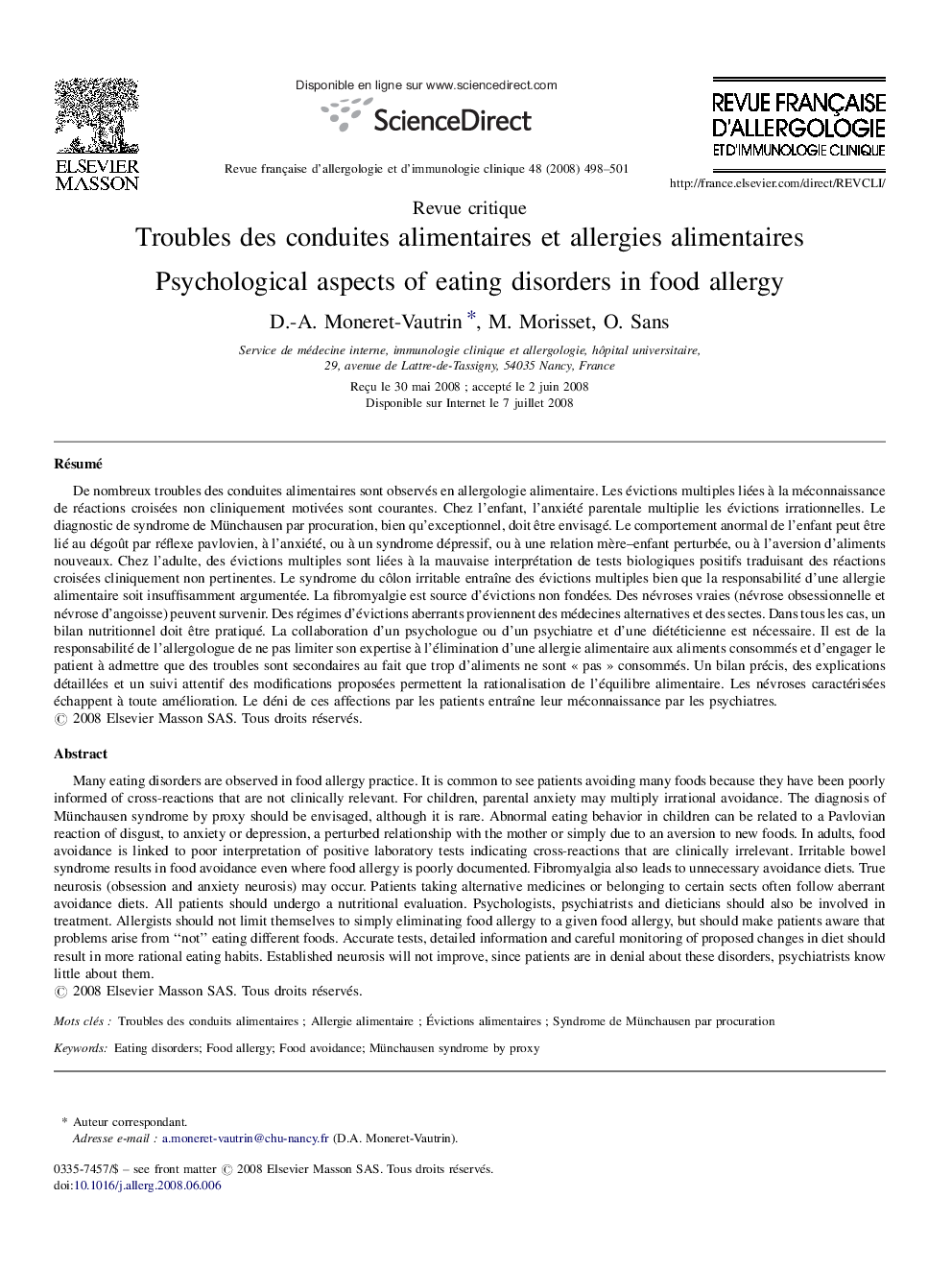| Article ID | Journal | Published Year | Pages | File Type |
|---|---|---|---|---|
| 2770117 | Revue Française d'Allergologie et d'Immunologie Clinique | 2008 | 4 Pages |
RésuméDe nombreux troubles des conduites alimentaires sont observés en allergologie alimentaire. Les évictions multiples liées à la méconnaissance de réactions croisées non cliniquement motivées sont courantes. Chez l’enfant, l’anxiété parentale multiplie les évictions irrationnelles. Le diagnostic de syndrome de Münchausen par procuration, bien qu’exceptionnel, doit être envisagé. Le comportement anormal de l’enfant peut être lié au dégoût par réflexe pavlovien, à l’anxiété, ou à un syndrome dépressif, ou à une relation mère–enfant perturbée, ou à l’aversion d’aliments nouveaux. Chez l’adulte, des évictions multiples sont liées à la mauvaise interprétation de tests biologiques positifs traduisant des réactions croisées cliniquement non pertinentes. Le syndrome du côlon irritable entraîne des évictions multiples bien que la responsabilité d’une allergie alimentaire soit insuffisamment argumentée. La fibromyalgie est source d’évictions non fondées. Des névroses vraies (névrose obsessionnelle et névrose d’angoisse) peuvent survenir. Des régimes d’évictions aberrants proviennent des médecines alternatives et des sectes. Dans tous les cas, un bilan nutritionnel doit être pratiqué. La collaboration d’un psychologue ou d’un psychiatre et d’une diététicienne est nécessaire. Il est de la responsabilité de l’allergologue de ne pas limiter son expertise à l’élimination d’une allergie alimentaire aux aliments consommés et d’engager le patient à admettre que des troubles sont secondaires au fait que trop d’aliments ne sont « pas » consommés. Un bilan précis, des explications détaillées et un suivi attentif des modifications proposées permettent la rationalisation de l’équilibre alimentaire. Les névroses caractérisées échappent à toute amélioration. Le déni de ces affections par les patients entraîne leur méconnaissance par les psychiatres.
Many eating disorders are observed in food allergy practice. It is common to see patients avoiding many foods because they have been poorly informed of cross-reactions that are not clinically relevant. For children, parental anxiety may multiply irrational avoidance. The diagnosis of Münchausen syndrome by proxy should be envisaged, although it is rare. Abnormal eating behavior in children can be related to a Pavlovian reaction of disgust, to anxiety or depression, a perturbed relationship with the mother or simply due to an aversion to new foods. In adults, food avoidance is linked to poor interpretation of positive laboratory tests indicating cross-reactions that are clinically irrelevant. Irritable bowel syndrome results in food avoidance even where food allergy is poorly documented. Fibromyalgia also leads to unnecessary avoidance diets. True neurosis (obsession and anxiety neurosis) may occur. Patients taking alternative medicines or belonging to certain sects often follow aberrant avoidance diets. All patients should undergo a nutritional evaluation. Psychologists, psychiatrists and dieticians should also be involved in treatment. Allergists should not limit themselves to simply eliminating food allergy to a given food allergy, but should make patients aware that problems arise from “not” eating different foods. Accurate tests, detailed information and careful monitoring of proposed changes in diet should result in more rational eating habits. Established neurosis will not improve, since patients are in denial about these disorders, psychiatrists know little about them.
